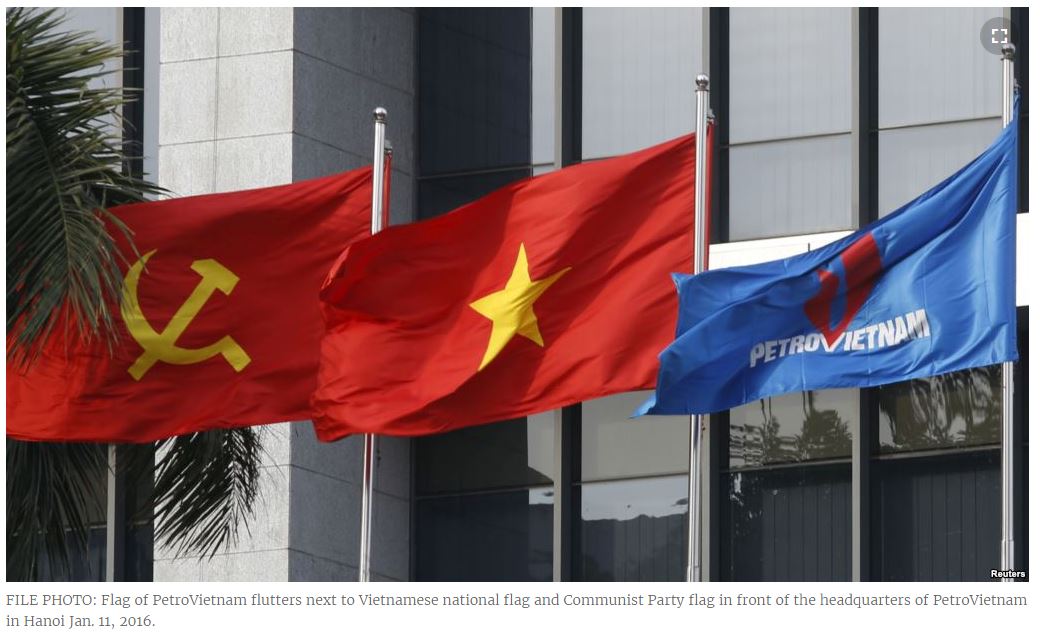World Oil Prices Help Vietnam Expand an Already Fast-Growing Economy
TAIPEI — An increase in world oil prices is helping Vietnam earn money that will quicken its already fast economic growth and may help the country build new infrastructure. The only red light: higher fuel prices among Vietnam’s consumers.
Vietnam, though not a major oil-producing nation like much of the Middle East, has counted energy-related commodities as its fifth highest source of exports. The industry is largely state-owned, including energy supplier PetroVietnam, with $3.1 billion in annual sales. Much of Vietnam’s energy comes from under the seas off its east and south coasts.
If crude oil prices hold at an average $65 per barrel this year, above last year’s average of US$60, economic growth will exceed the 6.7 percent target set by the legislature, the Communist Party of Vietnam’s website said last week.
“Vietnam has a huge level of natural gas reserves and a level of oil, so if the prices go up that would definitely be a boon for Vietnam,” said Ralf Matthaes, founder of the Infocus Mekong Research consultancy in Ho Chi Minh City.
“It would be another benefit for Vietnam, that look, Vietnam has more exports. It’s not just about coffee and rice,” he said.
World oil price hikes
The Vietnamese Ministry of Finance forecasts that total state revenue from crude oil exports will reach $3.13 billion in the first nine months of 2018, up 42.5% over the same period last year. The total for January through September would beat a full-year target.
The revenue increases for Vietnam reflect higher income from oil sales worldwide. World prices should reach $73 per barrel within the year and $74 next year, per estimates by the U.S. Energy Information Administration. Prices have gone up, the administration says, because of supply issues, including reports that U.S. sanctions on Iran will cut purchases.
“For the government and their state-owned enterprise PetroVietnam, it’s definitely good news,” said Frederick Burke, partner with the law firm Baker McKenzie in Ho Chi Minh City. “They’ve been really strained by that sort of weakness in their budget portfolio.”
Vietnam exports oil largely to Australia, China, Japan, Malaysia, Singapore and Thailand. Those sales contribute to a $224 billion economy that has grown by around 6 percent every year since 2012. Much of the growth comes from foreign-invested factories that make items such as auto parts and consumer electronics.
Vietnam will export around 11.23 million tons of crude oil this year, the Communist Party says.
What to do with the money
Oil revenue would give the government more funding for public infrastructure, Matthaes said. Vietnamese officials are building transport infrastructure so manufacturers can better move exports from factory floors to overseas markets. Ease of cargo shipping will help keep producers in Vietnam, which competes with China and much of Southeast Asia to win factory investment.
The government is spending now on expressways and urban mass transit to handle what the domestic news website VnExpress International calls “the country’s logistics shortcomings.”
State-owned enterprises might eventually build more oil refineries, as well, Burke suggested. Despite export revenues, Vietnam is a net importer of refined oil products because onshore refineries cannot meet the demands of a 95 million population along with industry.
Vietnam imports about 70 percent of its fuel for actual usage, mostly from China, Malaysia, Singapore, South Korea and Thailand.
Officials want to build more refineries to ensure Vietnam always has a steady fuel supply, Burke said. But he said a global “overcapacity” of refineries has cast doubt on ideas about opening more refineries in the country.
Inflation threat
Reliance on imports will raise the price of what common Vietnamese people pay for fuel, a threat to inflation, analysts and domestic media predict. Gasoline prices will rise 5 to 15 percent and may increase inflation by up to 0.64 percent over the year, the Communist Party says.
Officials in Hanoi set an inflation target of 4 percent for this year, but as of June it had already gone higher. Low prices help foreign investors as well as the millions of common motor scooter riders who still live in poverty.
Common consumers “feel the heat,” said Trung Nguyen, director of the Center for International Studies at Ho Chi Minh University of Social Sciences and Humanities. “They are used to the oil price rise, so I think that they can still withstand it, but I don’t know how far they can.”
Source: https://www.voanews.com/a/Vietnam-oil/4613714.html


 English
English




